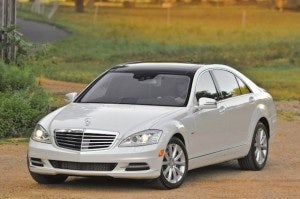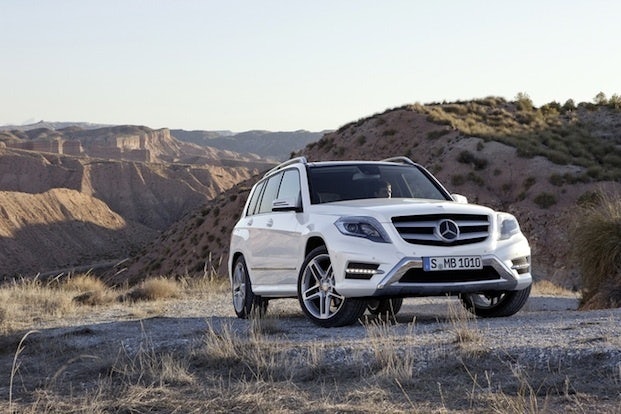Luxury Auto Sales Expected To Hit 2.25 Million Per Year In China By 2016#

With China expected to become the world's largest luxury auto market by 2016, surpassing the US with annual sales of 2.25 million, the world's top automakers continue to duke it out for market share, each investing millions into the market in the hopes of catching up with long-time market leader Audi. Having become the de facto ride of government official nationwide since the 1990s, Audi continues to rule China's high-end auto market, with sales rising 30 percent last year to 405,838 deliveries, yet rivals such as BMW are rapidly approaching, boosted by more appeal among entrepreneurs and younger drivers.
Last year, BMW sold over 296,000 units in China, a 38 percent increase year-on-year. Perhaps the interesting case in China's luxury auto industry, however, remains Mercedes-Benz, which -- despite a respected name and widespread appeal in the country -- saw China sales rise a tepid 1.5 percent last year to 196,211 cars.
So what is it about Mercedes-Benz that's seeing the company consistently overshadowed by Audi and BMW? Despite a high-profile manufacturing joint venture with Beijing Auto Industry Group (BAIC) in 2005, much of it boils down to a poor reading of market particularities and painfully slow responsiveness to consumer demand. As China Car Times writes this week, this is making the Chinese luxury auto market even more of a two-horse race between Audi and BMW.
From the article:
The C-Class is woefully out of date when compared to the latest 3-Series and far too small for Chinese tastes, the E-Class is also outgunned by the A4L and 5-Series, but a facelift due in the next few months to bring it in-line with the rest of the world’s models. The GLK is now made in China, but with a 3.0L V6 and the rest of the competition making use of smaller 2.0T engines the GLK is not winning too many fans. So far this year the GLK sold 4,678 units, Audi sold 13,535 Q5’s, and the X1 seems to be unusually slow with just 2,382 sold in January and February. The B-Class was launched late last year, but doesn’t seem to have gained much traction in the sales market, a 2.0T is due later this year along with the introduction of the much awaited CLA. The CLA will likely give the Mercedes brand a new impetus when it launches, presumably at the Shanghai Auto Show later this year and [hitting] the market shortly afterwards.
If Mercedes are going to succeed in catching up with BMW and Audi in the Chinese market, as they have promised so often to do, they are going to have to understand the Chinese consumer. Firstly the GLK will have to drop its six cylinder engine in favor of a 1.8T or a 2.0T, secondly the CLA is going to have to find its way into production ASAP. Likewise for the B-Class -- price both in the low-200,000 RMB range and consumers will be fighting their way into the dealerships. Rumor has it the new mini-SUV, the GLC, is also heading to China in 2014, with the B-Class due to roll down Beijing-Benz production lines in 2015 and a new C-Class in 2014, too, giving the impression that all is not quite lost for Mercedes. But they do have a lot of leg work to catch up in the Chinese market.

While this article brings up important points, it does not fully illustrate the complicated Mercedes story in China. As Jing Daily previously reported, the complexities of managing two separate Mercedes-Benz sales units in China contributed heavily to the marque’s underperformance in China. Earlier this year, Daimler finally merged its two Mercedes-Benz sales units in China into a single entity, the Beijing Mercedes-Benz Sales Service Co, a 50/50 joint venture between Daimler and its Chinese partner, BAIC. The unified company will distribute imported as well as locally produced vehicles and handle marketing, after-sales, used-car and fleet sales. Additionally, the company will be responsible for further development the Mercedes dealer network.Overseeing Daimler’s merged companies in China through a new board position is Hubertus Troska, a senior company executive, who spent over 24 years managing Mercedes-Benz truck operations in Europe and Latin America. Troska will hold the post until December 2015 at the earliest.
According to Stefan Bratzel, head of the Center of Automotive Research in Bergisch-Gladbach near Cologne, another problem with Daimler’s strategy in the China market is that the automaker failed to introduce new models at appropriate prices, establish cohesive brand positioning, and take into account the preference of wealthy Chinese buyers for luxury SUVs like Porsche’s Cayenne or BMW’s X5. As such, it’s not surprising that the Daimler has set about improving these and other marketing strategies in its China Sales Initiative 2015 project.
